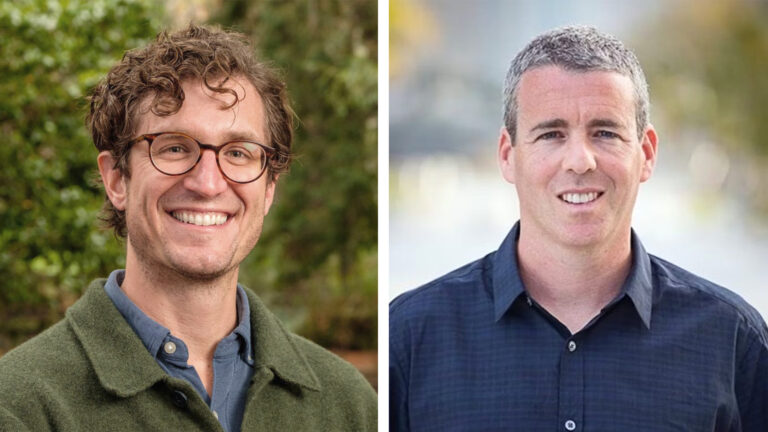Berkeley Talks: Feeding the World Without ‘Eating the Earth’
UC Berkeley Professor Timothy Bowles and journalist Michael Grunwald discuss the impact of our current agricultural methods and debate the ways we can ramp up food production without causing more harm to the environment.
Follow Berkeley Talks, a Berkeley News podcast that features lectures and conversations at UC Berkeley. See all Berkeley Talks.
By 2050, the global population is expected to reach about 10 billion people. That means we need to find a way to feed nearly 2 billion more mouths in the next 25 years. Industrial farming practices have already destroyed countless natural ecosystems, and experts say that expanding farmland even further would have devastating consequences for the planet.
In Berkeley Talks episode 227, UC Berkeley Professor Timothy Bowles and journalist Michael Grunwald discuss the impact of our current agricultural methods and debate the ways we can ramp up food production without causing more harm to the environment.

“Agriculture is eating the earth,” says Grunwald, author of the forthcoming book We Are Eating the Earth: The Race to Fix Our Food System and Save Our Climate. Farmland, he says, now covers two of every five acres on the planet, “and those are acres that used to be forest and wetlands and savannas that stored a lot of carbon and sheltered a lot of biodiversity.”
In order to avoid further destruction, he contends, we must produce more food on land we already farm by improving the efficiency of our existing industrial systems. “We can’t keep expanding agriculture’s footprint and shrinking nature’s, not if we want a stable climate and a biodiverse planet,” he says. “We can’t keep tearing down a soccer field worth of rainforest every six seconds for agriculture. But we’ve also got to eat. So we’re going to need to make a lot more food without a lot more land.”
While Bowles agrees that expanding farmland isn’t the answer, he counters that industrial agriculture isn’t either; he argues that industrial farming is detrimental to the environment and human health and perpetuates social and economic inequality. Instead, he advocates for agroecology — sustainable farming that allows farmers to work with nature to create resilient and productive food systems.
“It’s already happening all over the world,” says Bowles, an associate professor in the Department of Environmental Science, Policy and Management at UC Berkeley and lead faculty director of the Berkeley Food Institute. “What hasn’t been happening is the political will to make it the foundation of our food system.”
Agroecology isn’t just better for the planet, he continues — it can also be highly efficient. Since 1985, the organization Practical Farmers of Iowa has been working with farmers to develop innovative cropping systems that can reduce the use of pesticides and other toxic inputs by 90% while increasing yields of corn and soybean. In Kenya, farmers and researchers have been employing companion planting techniques to combat pests and disease problems without using toxic chemicals. On the farms of the 350,000 farmers who have adopted these methods, says Bowles, yields have tripled.
“Coming back here to California, agroecology is when 1.6 million schoolchildren are eating lunches that are not taco beef sticks,” he says, “but fruits and vegetables and whole grains that are supplied by California farms that are using climate-smart agricultural practices supported by state investments, and building on the successes of an organic agricultural industry that is currently [worth] $11 billion.”
This conversation took place on April 17, 2025, and was sponsored by the Berkeley Food Institute. It was moderated by New York Times correspondent Kim Severson. Watch a video of the conversation.
Read the transcript.
Listen to other episodes of Berkeley Talks here.
